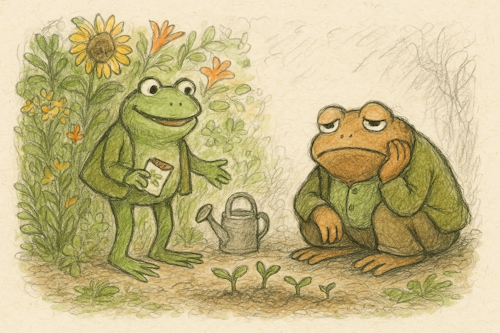Frog & Toad: The Garden
Illustrates Patience, Consistency, Agile Mindset
In Agile transformations, one of the hardest lessons for leaders and teams is learning to trust the process. We want fast results. We push. We escalate. We demand growth. But meaningful improvement takes time. The role of an Agile coach is often less about accelerating progress and more about protecting the conditions that allow growth to happen.
Arnold Lobel's story The Garden, from Frog and Toad Together1, offers a surprisingly powerful metaphor for Agile adoption and team development.
Toad visits his friend Frog's lush and thriving garden and decides he wants one just like it. Frog gives him some seeds and basic advice: plant them, water them, and wait.
Toad plants the seeds but quickly becomes frustrated when they don't grow right away. He tries everything, shouting, playing music, reading stories, and staying up all night, to get the seeds to grow faster. Nothing seems to work.
Frog gently reminds Toad that growing a garden takes time and patience. Eventually, the seeds begin to sprout. Toad is overjoyed but also exhausted. He looks at the tiny plants and sighs, “Yes, but it was very hard work.”
Lessons Learned
Growth Takes Time
Agile transformations often feel urgent, especially when pressure comes from the top. But meaningful change doesn't happen through force. It emerges over time through deliberate practice, reflection, and adaptation. Like seeds in the soil, new behaviors and mindsets need time to take root. Rushing the process may lead to superficial compliance rather than deep understanding.

Support Matters More Than Control
Frog provides Toad with the tools, encouragement, and space to grow his garden, but he doesn't micromanage. This is a model for healthy leadership. Teams need guidance, not constant intervention. When leaders and coaches shift from control to support, they enable autonomy, learning, and accountability.
Anxiety Leads To Noise, Not Outcomes
Toad's frantic efforts, shouting at the seeds, performing for them, staying up late, reflect a common organizational response to uncertainty. When leaders don't see quick results, they often add more processes, meetings, or metrics. This noise creates stress and confusion. It rarely improves outcomes. Sustainable agility requires calm focus and trust.
Psychological Safety Encourages Patience
Frog doesn't criticize or mock Toad's behavior. He offers reassurance and models calmness. Teams that feel safe are more likely to experiment, learn, and recover from mistakes. Psychological safety isn't just a cultural luxury. It's the foundation for the kind of steady growth Agile frameworks are designed to support.
Systems Need Tending
A garden doesn't thrive just because seeds are planted. It needs the right balance of light, water, space, and care. Agile teams are no different. Tools and ceremonies are important, but without attention to the larger system, team dynamics, leadership behavior, workflow design, growth will stall. Coaches help teams cultivate the full environment for success.
Let Outcomes Emerge
Toad's breakthrough only happens when he stops trying to force it. Agile is not about command-and-control delivery. It is about creating the right conditions and allowing value to emerge. Coaches and leaders should learn to observe progress with curiosity rather than demand immediate payoff.
Coaching Tips
- Focus on the Soil, Not Just the Plant: Help shape environments where psychological safety, feedback, and continuous learning are valued. Healthy systems produce healthy outcomes.
- Help Leaders Adjust Expectations: This parable can help stakeholders see why immediate results are not the best measure of long-term progress. Lasting change is often slow and steady.
- Make it Visual and Relatable: Use metaphors in Retrospectives or workshops. Ask teams, "What are we planting?" or "How are we nurturing our growth?" This makes the conversation more accessible and reflective.
- Normalize Slow Progress: Remind teams that long quiet periods are not wasted time. Important things may be happening beneath the surface, just like in a real garden.
The Garden reminds us that lasting growth does not come from pressure or noise. It comes from patience, support, and the willingness to let natural development unfold. Agile coaches, like Frog, do not rush the process. Instead, they foster the right environment and trust that good things will grow.
If your team seems stuck, it may not need louder voices. It may need more care and more time.


